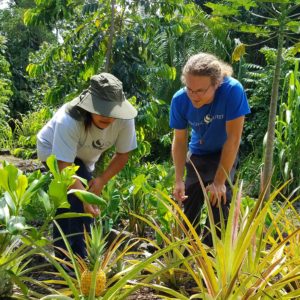By: Sharon Findlay, Admissions & Communication Manager
Pacific Quest is excited to announce enhanced clinical services in our young adult program! Based on the need and intensity during the Kuleana Phase, PQ has added another therapist to support students through this critical stage of the program. Students will continue to meet with their primary therapist and now will also engage with the Kuleana Therapist, resulting in field-based therapy four days per week during the Kuleana phase to target individualized treatment goals.
What is the Kuleana Phase in the Young Adult Program?
The second of six phases, Kuleana, or personal responsibility, is the foundation of the Young Adult Program at Pacific Quest. Most of the core themes and expectations are identified in this phase and then further developed and sustained throughout treatment. During Kuleana, young adults begin sharing their “story” while simultaneously taking on the responsibilities which help to maintain a functioning community. Kuleana is about exploring the interplay between who a person is, who he/she wants to become, and what he/she is willing to do to get there. Young adults in this phase are in a separate location from the Reeds Bay facility where they are immersed in land, wellness, and other vital aspects of Pacific Quest’s Rite of Passage model.
This immersion model of therapy is an exciting development for this important phase in our program! The Kuleana Therapist will coordinate directly with primary therapist and the field team, and will function as a field-based extension of the primary therapist while students are in Kuleana. Alex Stitt has been selected to pioneer this role.

“By having someone there more frequently to manage the steps incrementally, we’ll be able to take full advantage of this specific phase of the program,” shares Dr. Lorraine Freedle, Clinical Director. “Alex brings not only clinical expertise but field expertise from his extensive experience over the past three years at Pacific Quest. His keen understanding of the identity level work and how it ties into the land work makes him an ideal Kuleana Therapist.”
Alex Stitt, Kuleana Therapist, adds, “Given that Kuleana is about personal responsibility, the phase is spent doing a lot of depth work around one’s personal values, what one is accountable for, and their locus control and responsibility. Progressively, our students begin to take ownership of their life.”
With this added layer of clinical support, young adults will more effectively navigate Kuleana and develop a solid foundation for their treatment at Pacific Quest.
Kuleana Therapist Role: another layer of clinical support
By: Sharon Findlay, Admissions & Communication Manager Pacific Quest is excited to announce enhanced clinical services in our young adult program! Based on the need and intensity during the Kuleana Phase, PQ has added another therapist to support students through this critical stage of the program. Students will continue to meet with their primary therapist …
By: Sharon Findlay, Admissions & Communication Manager
Pacific Quest is excited to announce enhanced clinical services in our young adult program! Based on the need and intensity during the Kuleana Phase, PQ has added another therapist to support students through this critical stage of the program. Students will continue to meet with their primary therapist and now will also engage with the Kuleana Therapist, resulting in field-based therapy four days per week during the Kuleana phase to target individualized treatment goals.
What is the Kuleana Phase in the Young Adult Program?
The second of six phases, Kuleana, or personal responsibility, is the foundation of the Young Adult Program at Pacific Quest. Most of the core themes and expectations are identified in this phase and then further developed and sustained throughout treatment. During Kuleana, young adults begin sharing their “story” while simultaneously taking on the responsibilities which help to maintain a functioning community. Kuleana is about exploring the interplay between who a person is, who he/she wants to become, and what he/she is willing to do to get there. Young adults in this phase are in a separate location from the Reeds Bay facility where they are immersed in land, wellness, and other vital aspects of Pacific Quest’s Rite of Passage model.
This immersion model of therapy is an exciting development for this important phase in our program! The Kuleana Therapist will coordinate directly with primary therapist and the field team, and will function as a field-based extension of the primary therapist while students are in Kuleana. Alex Stitt has been selected to pioneer this role.
“By having someone there more frequently to manage the steps incrementally, we’ll be able to take full advantage of this specific phase of the program,” shares Dr. Lorraine Freedle, Clinical Director. “Alex brings not only clinical expertise but field expertise from his extensive experience over the past three years at Pacific Quest. His keen understanding of the identity level work and how it ties into the land work makes him an ideal Kuleana Therapist.”
Alex Stitt, Kuleana Therapist, adds, “Given that Kuleana is about personal responsibility, the phase is spent doing a lot of depth work around one’s personal values, what one is accountable for, and their locus control and responsibility. Progressively, our students begin to take ownership of their life.”
With this added layer of clinical support, young adults will more effectively navigate Kuleana and develop a solid foundation for their treatment at Pacific Quest.
Questions? Call or Text our Admissions Team: 808-937-5806